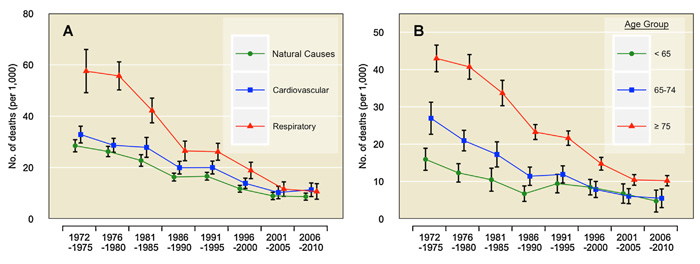| Tweet | Follow @co2science |
Paper Reviewed
Ng, C.F.S., Boeckmann, M., Ueda, K., Zeeb, H., Nitta, H., Watanabe, C. and Honda, Y. 2016. Heat-related mortality: Effect modification and adaptation in Japan from 1972 to 2010. Global Environmental Change 39: 234-243.
Writing as background for their work, Ng et al. (2016) state that "excessive heat is a health risk," but they also say that "previous studies have observed a general decline in sensitivity to heat despite increasing temperatures." Noting, therefore, that "conclusive evidence is lacking on whether long-term changes of this sensitivity can be attributed to specific adaptation measures, such as air conditioning [AC], or should be linked to societal adaptation such as improved healthcare systems or socioeconomic well-being," they proceed to analyze "daily total [from natural causes], cardiovascular and respiratory disease mortality and temperature data from 1972 to 2010 for 47 prefectures," using a Poisson generalized linear model to estimate the effect of heat on mortality," along with "a random effects model to obtain the mean national effect estimates, and meta-regression to explore the impact of prefecture-level characteristics." And what did they find in so doing?
Ng et al. report that their data "show a general decrease in excess heat-related mortality over the past 39 years despite increasing temperatures [of approximately 1°C]," demonstrating, in their words, "that some form of adaptation to extreme temperatures has occurred in Japan." More specifically, as illustrated in the figure below, their data revealed a national reduction of 20, 21 and 46 cases of deaths per 1,000 due to natural, cardiovascular, and respiratory causes, respectively, which reductions correspond to astounding respective percentage drops of 69, 66 and 81 percent! Similar percentage declines were also noted when analyzing the number of deaths by age group, with the most elderly population age group experiencing the greatest death rate percentage declines (Figure 1b).

Figure 1. (Panel A) National average for the number of excess heat-related deaths (per 1,000) by 5-year periods from 1972 to 2010 in Japan (note that the first period has only 4 years) attributable to 1°C increases in the same-day summer temperature. (Panel B) Same as Panel A, but stratified by age group for all causes of natural death. Similar results were found when stratified for cardiovascular and respiratory deaths. Source: Ng et al. (2016).
In commenting on these notable health improvements, Ng et al. write that an "increase of AC prevalence was not associated with a reduction of excess mortality over time," yet they note that "prefectures and populations with improved economic status documented a larger decline of excess mortality," adding that "healthcare resources were associated with fewer heat-related deaths in the 1970s, but the associations did not persist in the more recent period (i.e., 2006-2010)." Whatever the cause or causes, one thing is certain; whereas the temperature rose, human death rates declined ... and we would call that a good thing!
Posted 11 January 2017



